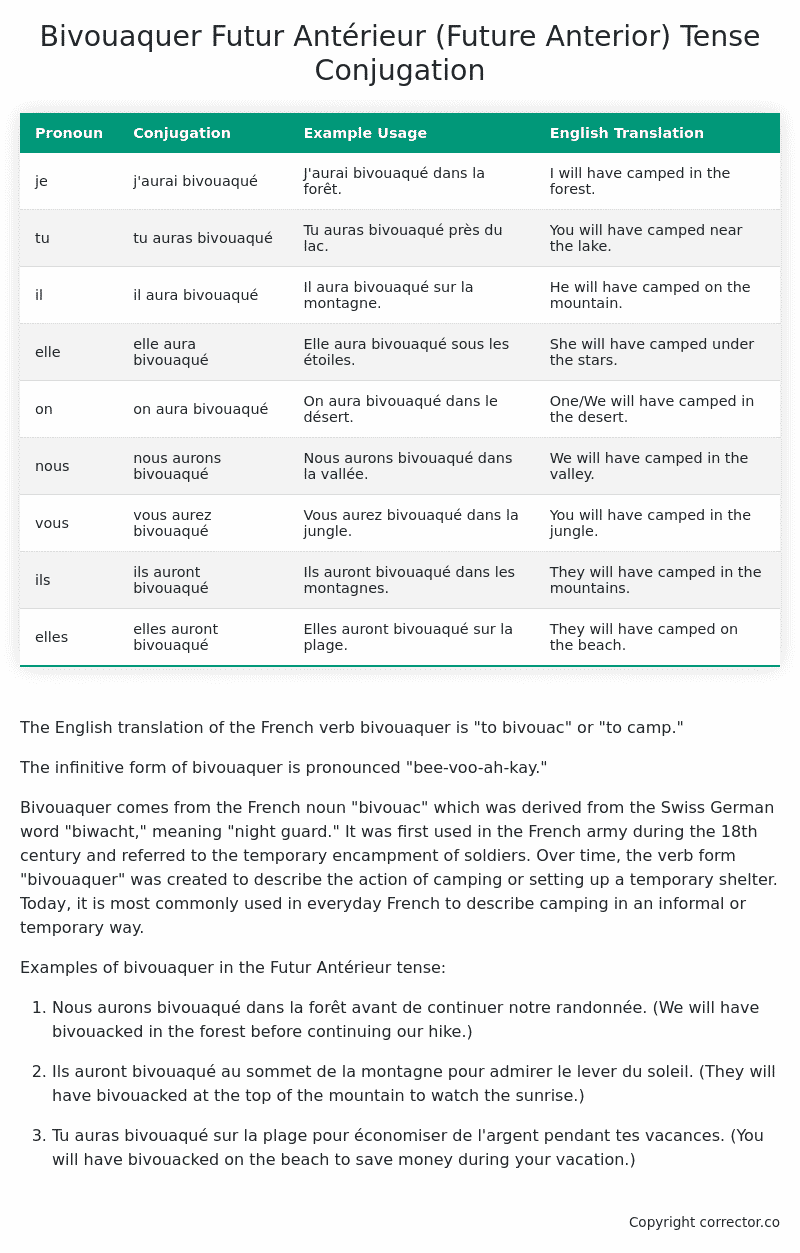Futur Antérieur (Future Anterior) Tense Conjugation of the French Verb bivouaquer
Introduction to the verb bivouaquer
The English translation of the French verb bivouaquer is “to bivouac” or “to camp.”
The infinitive form of bivouaquer is pronounced “bee-voo-ah-kay.”
Bivouaquer comes from the French noun “bivouac” which was derived from the Swiss German word “biwacht,” meaning “night guard.” It was first used in the French army during the 18th century and referred to the temporary encampment of soldiers. Over time, the verb form “bivouaquer” was created to describe the action of camping or setting up a temporary shelter. Today, it is most commonly used in everyday French to describe camping in an informal or temporary way.
Examples of bivouaquer in the Futur Antérieur tense:
-
Nous aurons bivouaqué dans la forêt avant de continuer notre randonnée. (We will have bivouacked in the forest before continuing our hike.)
-
Ils auront bivouaqué au sommet de la montagne pour admirer le lever du soleil. (They will have bivouacked at the top of the mountain to watch the sunrise.)
-
Tu auras bivouaqué sur la plage pour économiser de l’argent pendant tes vacances. (You will have bivouacked on the beach to save money during your vacation.)
Table of the Futur Antérieur (Future Anterior) Tense Conjugation of bivouaquer
| Pronoun | Conjugation | Example Usage | English Translation |
|---|---|---|---|
| je | j’aurai bivouaqué | J’aurai bivouaqué dans la forêt. | I will have camped in the forest. |
| tu | tu auras bivouaqué | Tu auras bivouaqué près du lac. | You will have camped near the lake. |
| il | il aura bivouaqué | Il aura bivouaqué sur la montagne. | He will have camped on the mountain. |
| elle | elle aura bivouaqué | Elle aura bivouaqué sous les étoiles. | She will have camped under the stars. |
| on | on aura bivouaqué | On aura bivouaqué dans le désert. | One/We will have camped in the desert. |
| nous | nous aurons bivouaqué | Nous aurons bivouaqué dans la vallée. | We will have camped in the valley. |
| vous | vous aurez bivouaqué | Vous aurez bivouaqué dans la jungle. | You will have camped in the jungle. |
| ils | ils auront bivouaqué | Ils auront bivouaqué dans les montagnes. | They will have camped in the mountains. |
| elles | elles auront bivouaqué | Elles auront bivouaqué sur la plage. | They will have camped on the beach. |
Other Conjugations for Bivouaquer.
Le Present (Present Tense) Conjugation of the French Verb bivouaquer
Imparfait (Imperfect) Tense Conjugation of the French Verb bivouaquer
Passé Simple (Simple Past) Tense Conjugation of the French Verb bivouaquer
Passé Composé (Present Perfect) Tense Conjugation of the French Verb bivouaquer
Futur Simple (Simple Future) Tense Conjugation of the French Verb bivouaquer
Futur Proche (Near Future) Tense Conjugation of the French Verb bivouaquer
Plus-que-parfait (Pluperfect) Tense Conjugation of the French Verb bivouaquer
Passé Antérieur (Past Anterior) Tense Conjugation of the French Verb bivouaquer
Futur Antérieur (Future Anterior) Tense Conjugation of the French Verb bivouaquer (this article)
Subjonctif Présent (Subjunctive Present) Tense Conjugation of the French Verb bivouaquer
Subjonctif Passé (Subjunctive Past) Tense Conjugation of the French Verb bivouaquer
Subjonctif Imparfait (Subjunctive Imperfect) Tense Conjugation of the French Verb bivouaquer
Subjonctif Plus-que-parfait (Subjunctive Pluperfect) Tense Conjugation of the French Verb bivouaquer
Conditionnel Présent (Conditional Present) Tense Conjugation of the French Verb bivouaquer
Conditionnel Passé (Conditional Past) Tense Conjugation of the French Verb bivouaquer
L’impératif Présent (Imperative Present) Tense Conjugation of the French Verb bivouaquer
L’infinitif Présent (Infinitive Present) Tense Conjugation of the French Verb bivouaquer
Struggling with French verbs or the language in general? Why not use our free French Grammar Checker – no registration required!
Get a FREE Download Study Sheet of this Conjugation 🔥
Simply right click the image below, click “save image” and get your free reference for the bivouaquer Futur Antérieur tense conjugation!

Bivouaquer – About the French Futur Antérieur (Future Anterior) Tense
Construction
Common Everyday Usage Patterns
Interactions with Other Tenses
For example
Summary
I hope you enjoyed this article on the verb bivouaquer. Still in a learning mood? Check out another TOTALLY random French verb conjugation!


